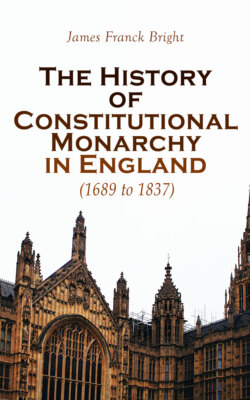The History of Constitutional Monarchy in England (1689 to 1837)

Реклама. ООО «ЛитРес», ИНН: 7719571260.
Оглавление
James Franck Bright. The History of Constitutional Monarchy in England (1689 to 1837)
The History of Constitutional Monarchy in England (1689 to 1837)
Table of Content
WILLIAM AND MARY (1689-1702)
ANNE (1702-1714)
GEORGE I (1714-1727)
GEORGE II (1727-1760)
GEORGE III (1760-1820)
GEORGE III—CONTINUED (1789-1820)
GEORGE IV (1820-1830)
WILLIAM IV (1830-1837)
FOOTNOTES
Отрывок из книги
James Franck Bright
e-artnow, 2022
.....
Violent character of the Revolution in Scotland.
The same week which saw the relief of Londonderry and the battle of Newton Butler was remarkable also for the great defeat of William's army at Killiecrankie. In accordance with the character of the Scotch people, and in some proportion to the cruelty which had been exercised upon them, the Revolution in Scotland took a more violent form than it had assumed in England, for in the North James had been able to carry out more completely those plans which had produced his fall in the southern kingdom. A Church repugnant to the majority of the people had been forced upon them by law; in defiance of the opposition of a subservient Parliament, all the high places had been filled with Papists; nonconformity had been punished with an arbitrary severity and a ferocious cruelty of which England showed no counterpart; the electoral laws also, by requiring from all electors abjuration of the Covenant and an assertion of the King's ecclesiastical supremacy, excluded all but Prelatists from the right of election. Before collecting a national Convention, to consider the state of the nation under the present circumstances, it was necessary to dispense with the Act which excluded Presbyterians from the franchise. The Convention consequently consisted almost exclusively of Whigs, and the change of Government was marked by grave disorders in many parts of the country; nor, though William disliked these excesses, was he able to repress them, and the Episcopal clergy were in many instances most Opposition to a union. roughly used. There was at first some talk of a union with England, for the national feeling of the Scotch was beginning to yield to the increasing belief that in most points, especially of a financial and commercial character, such a union was very desirable; while many even of the Whigs in England wished for a union of the Churches and the establishment of Episcopacy on some broad and general basis. But the religious feeling of the country was quite averse to such a course, and William was too tolerant a man to wish to apply any coercion to men's consciences. He therefore wrote a letter, in which he did little else than profess his attachment to Protestantism, and his wish if possible to establish the Union. The arrangements he left in their own hands.
.....